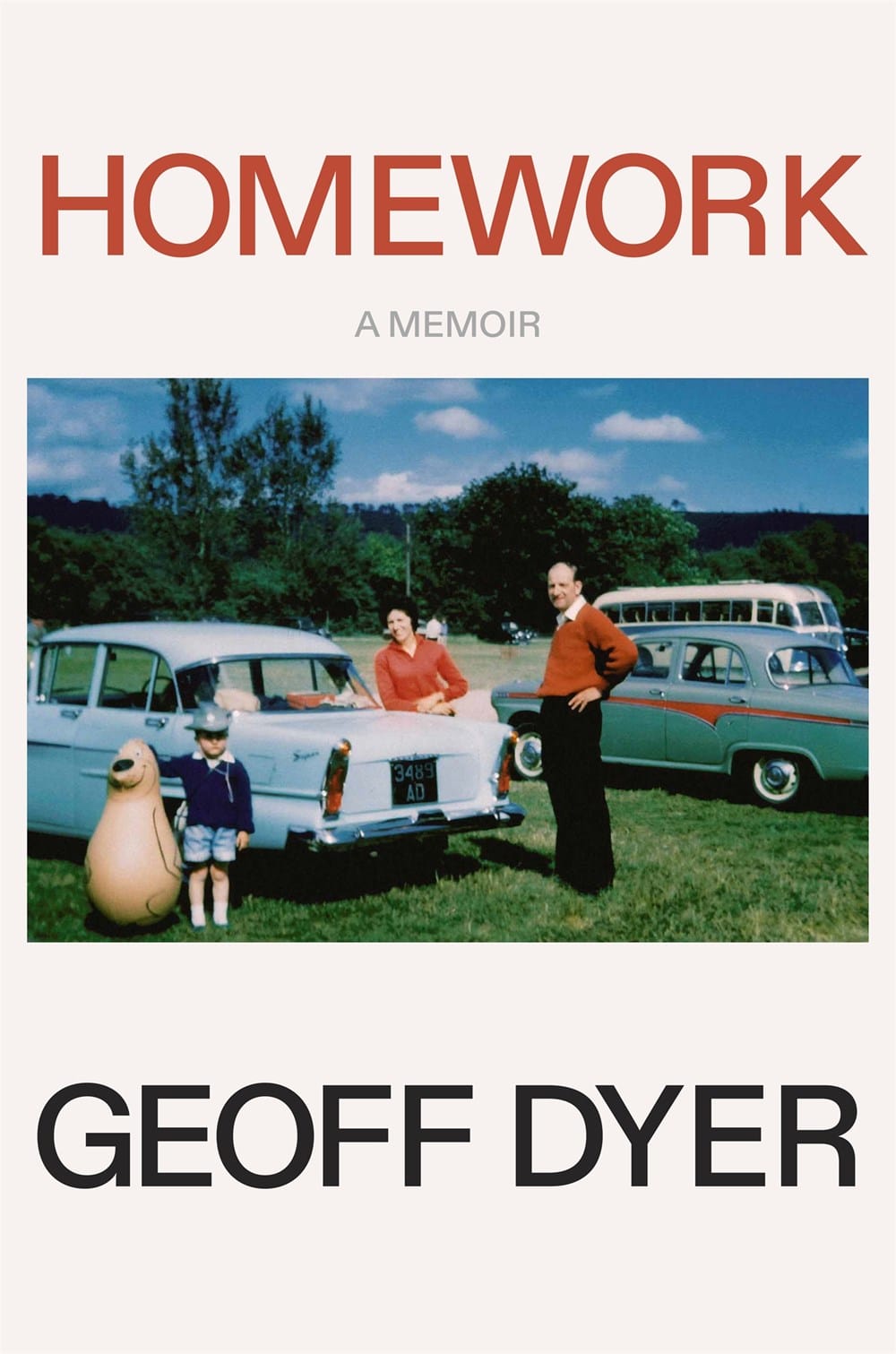Review: Homework, by Geoff Dyer

Review: Homework by Geoff Dyer
Farrar, Strauss and Giroux, June 2025
I know I am not alone or even original in thinking a lot about artificial intelligence and large language models lately. My considerations of the use and meaning of AI have been seeping into everything, whether I like it or not, including a memoir written by a human about his life decades before ChatGPT was released to the public. The question I keep asking myself, when it comes to generative AI, is what people are doing instead. Like, if you’re using an LLM to write dozens or hundreds of ebooks, or your papers for college courses, or to create a list of forthcoming books that don’t exist, what else are you doing with the time you’ve ostensibly saved? What did you save it for? Are you working another job to make ends meet? Are you spending time with your family? Are you getting high and playing video games? I truly don’t care which of these might be the case, and I pass no judgement on any of these as good or bad ways to spend one’s time. But if writing an ebook or a paper or a freelance book roundup isn’t on your list of fun or interesting or enlightening things to do, why do it at all? You could just not write ebooks, or go to trade school instead of university, or get high and play video games without ever entering a prompt to get ChatGPT to write something for you.
You might be wondering, What on earth does this have to do with Homework by Geoff Dyer? That is a great question, because Dyer does not address AI or LLMs at all in his memoir. They have no place in his story or his telling of it. And yet, the losses that we’re going to experience in our AI moment are foreshadowed in his history.
The rock tumbler that is my brain started working on the AI question when Dyer delves into the process of collecting. In his boyhood, Dyer collected cards from packets of tea, model airplanes, and toy soldiers, and eventually graduated to a teenage obsession with vinyl records. Nothing at all unusual in any of this, and the collections themselves and the process of collecting these things are overexplained for my taste.
But Dyer makes a distinction between collecting, which has an end point, like completing a set, and “accumulating…with no fixed goal in mind.” A full set of Wild Birds of Britain was collecting; a tin full of marbles was accumulating. To illustrate the futility of accumulation, Dyer shares a story of a friend’s dad who gamed a system of collecting stamps from the petrol station to earn a toy car. He was able to sidestep the way the stations would deface a page to keep people from turning in cards more than once, and so he could turn in the same cards to receive multiple toy cars. “We all admired the cunning,” Dyer writes, “but in some ways this took the fun out of the whole thing, and despite the short-term satisfactions I see now that it detracted from the incremental purpose of collecting (and, by extension, life).”
Is this a grand, or even grandiose, statement by Dyer: “the purpose of colleting (and, by extension, life)”? It was just a little cheat to get some toy cars out of British Petroleum or whoever ran the local stations. But it chimed for me with the use of generative AI to create instant art, which is arguably not art at all. The incremental purpose is the point. The first draft, the revisions, the workshopping, the editing, the refinement of one’s argument or ideas (which I have wrestled with repeatedly over the course of creating this essay) are life. Likewise, the cartoon sketched on the canvas, the application of the first layers of oil paint, the shading and highlighting, the stepping back, the starting over, the deciding the work is done because it is due to be hung somewhere, is the point. The iteration is the point. The increments are what give art and, by extension, life, its shape. AI lays out an entire novel or image at once with no increments, no iterations, no life.
Later in the book, Dyer is discussing his dad’s frugality, his near phobia of paying too much or even wanting too much. “Too much, too many: always he was at odds with any suggestion of the abundance which was increasingly declaring itself as one of the goals not just of the economy or even of liberal democracy but of life itself.” Here again we have life hanging in the balance between collecting with purpose and the mere accumulation of abundance as a goal. Dyer makes clear that his family was not poor and was never without; he had a comfortable childhood filled with toys and bikes and accumulated marbles in a tin. But it was not an abundant life, because his father stood on guard against abundance.
In the twenty-first century, people work to cultivate an abundance mindset, a mentality that will settle for nothing less than a life in excess of enough. Human hands and minds can only do so much; to live in abundance requires extra-human efforts, like AI. And while Dyer’s dad seems to have lived maybe a bit too cheaply, too parsimoniously, too much in self-abnegation, the rest of the world (not all of it, but much of it) is now striving toward an AI-provided abundance, an accumulation of AI-generated words, images, music, fashion. It’s not clear to me, once we have accumulated this abundance, what we’re supposed to do with it. Look at it? Talk about it? Post it on social media, I guess. Maybe that’s what the people who write books using LLMs do: they spend the time they would have used to write a book, including all of its incremental stages, on social media. I am guessing; I genuinely do not know.
Throughout the book, Dyer talks about his mum making and mending his clothes, and her unrealized dream of being a seamstress. At one point, she acquires a knitting machine. “This enabled her to produce on a larger scale but it took the pleasure out of knitting, turned the living room into a factory.” He tells a similar story about his dad’s garden. His dad lucks into both a larger garden plot and a rototiller (rotavator, in the British). It makes it easier and quicker for his dad to work the double-sized garden, but “it, like the knitting machine, imparted a quality of industrialization to what had been in some was a bucolic hobby. While reducing the amount of work it also increased the work-like aspect of what had to be done.”
These are early days for both the rise of labor-saving devices and the return to handcrafted hobbies, like knitting and woodworking. The knitting machine and the rototiller both removed the incremental from the process of creation on human and industrial scales. “In our own small way,” Dyer writes, “we had replicated the transformation of England from a rural agrarian society to a semi-industrialised one which left the workers exhausted and unhappy, enslaved by the technology that was intended to be the engine of their liberation.”
I keep coming back to the same questions, here in 2025: What is AI intended to liberate us from doing? And what will it liberate us to do? Maybe it’s intended to give us free time, but what do we intend to do with that free time? Consume and create AI-generated content in an ouroboros of accumulation? That sounds exhausting. And unfulfilling.
Homework, as I say, is not at all about artificial intelligence or large language models. It’s an indictment of twentieth-century capitalistic norms and a celebration of a boyhood that got to have multiple bikes and model airplanes. But it’s also about living in the increments, making meaning from a life rather than skimming across its shiny surface.
Links to stuff in this post:
Homework, Geoff Dyer: https://bookshop.org/a/7065/9780374616229
(I receive an affiliate commission from Bookshop.org if you order using these links. Thank you!)
KHG’s latest translations, Memoirs of a French Courtesan Volume 1: Rebellion, Volume 2: Spectacle, and Volume 3: Luck, are available now.
